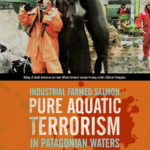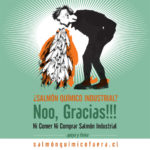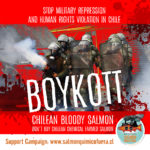Public Statement
Campaign #SalmónQuímicoFuera
Our menu & sea free from industrial salmon
salmonquimicofuera.cl
For the defense of public health, marine ecosystems, food sovereignty and the rights of consumers, coastal communities and native peoples.
The massive productions of industrially farmed salmonoids, amounting to 842,679 tonne in 2018, places Chile as the world's second largest producer of Atlantic salmon (Salmo salar) and as the world's largest producer of Rainbow trout (Oncorhynchus mykiss). The farming of these predatory fishes, introduced into Chilean waters, is associated with intense use of natural resources (sweet water, coastal territories, cheap energy and labor, and wild fish used for fishmeal), along with the use of financial capital, biotechnology and a variety of chemical and pharmaceutical supplements.
The high densities of salmons in the sea cages used for farming coupled with the intensity of the production processes make these fishes very vulnerable to viral, bacterial and parasitic diseases. To overcome this, the industry applies massive and indiscriminate amounts of a variety of chemicals, such as antibiotics, antiparasitics, coloring agents, disinfectants, antifungal substances and antifouling (antiadherent) agents. This generates devastating impacts on the environment and the marine and terrestrial biodiversity of the archipelago Chiloé and the Patagonian regions of Aysén and Magallanes. In the last 20 years, the territorial and productive expansion of this industry has introduced more than 20 bacterial, viral and parasitic diseases in Chilean waters.
Currently, 98% of the Chilean production of salmon and trout are destined for export, making clear that this mega industry behaves itself as a colonial style economic enclave throughout our coasts, with little thought to decent work or the national needs of alimentation, transforming the coastal territories into "sacrifice zones". This industry performs its dirty work by depositing tonnes of chemical and organic contaminants in the rivers, lakes and coastal-marine zones - while conducting its clean business exporting salmons to the USA, Japan, Brazil, China, Russia, EU and 70 countries more.
The Chilean aquaculture of salmonids is the one using the largest volume of antimicrobials compared to other countries. 95% of the total volume of antibiotics imported annually to Chile is consumed by farmed salmon, dramatically exceeding what is used in human medicine. For every tonne salmon produced in 2016, 540 g of antibiotics were used - exceeding the amount used in the world's number one producer, Norway, by 700 times. In 2018, the industry used 322 g of antimicrobials per tonne salmon, while the cattle industry used a world average of 45 g of antibiotics per tonne meat.
Bacterial resistance: One of the major challenges of the 21th century. Bacterial resistance - along with climate change, the crisis of the oceans and waters and the pandemic of obesity - make up the major challenges facing human societies. The oligopolistic producers of animal protein and the transnational pharmaceutical industry have, for decades, rendered invisible the great threat that abusive use of antibiotics mean for public health, the environment and for citizen rights.
The United Nations (UN) warns that 10 million people will die annually in the year of 2050 due to lack of efficient antibiotics to combat diseases once treatable, if urgent means are not taken to control the abusive use of antimicrobials. The World Health Organization (WHO), the Food and Agriculture Organization of the United Nations (FAO) and the World Organisation for Animal Health (OIE) have developed a global campaign against the abusive and unregulated use of antimicrobials and the threat of bacterial resistance.
Various investigations in the south of Chile have registered residuals of tetracyclines and quinolone antibiotics in wild fish consumed by humans and in marine sediments adjacent to farming centers. Consumers should know that the antimicrobials used in salmons have the capacity to modify the normal bacterial flora of the human body, since the remaining bacteria in the medicated food and excrements of these fishes may transfer resistant genes to the bacteria normally inhabiting human beings, animals and the terrestrial and aquatic ecosystems.
After 25 years of salmon industry, the archipelago of Chiloé has become a global laboratory for monitoring the effects of bacterial resistance in food chains, on marine biodiversity and on the health of salmon industry workers, their families and local communities.
Impacts of salmon farming centers in the archipelago of Chiloé
The production of 842,679 tonnes of salmonids quadruples the burden on the fragile aquatic ecosystems of southern Chile. This intense industrial pressure comes with the daily emission of thousands of tonnes of chemical and organic contamination. The phosphorus and nitrogen rich residues - stemming from the excrements of the salmons and food not consumed - fall to the seafloor, generating conditions for periodical algae blooms, eutrophication and seafloor anoxia. These processes have severe consequences for human health, marine biodiversity and the economies of communities in southern Chile dependant on fishing and gathering of algae and shellfish.
The abusive expansion of the salmon industry in coastal, lacustrine and fluvial areas impose changes in territorial vocation and regional economies for communities traditionally dependant on agriculture, stockbreeding, tourism, fishery and small scale gathering, in turn affecting the ancestral rights of the Mapuche people, the communities of Chiloé, and the Kawésqar and Yagan of Patagonia.
The intensive use of already overfished sites of mackerel, sardine and anchovy, among others, destine millions of tonnes of wild fish to become fishmeal and fish oil, used to feed salmons and trouts, later to be exported out of the country. This has a negative impact on national and regional food security, since every tonne of salmon produced require between 3 to 5 tonne of wild fish in the form of fishmeal and fish oil.
Laborwise, the permissive laws and regulations in force - coupled with weak mechanisms for governmental supervision - allow for national and transnational companies operating in Chile to violate the law and apply "double standards" with regards to labor and social issues. An example of such a violation is the fact that 31 workers have died in farming centers, processing plants and transports of the salmon industry between March 2013 and January 2019. This means that the salmon companies operating in Chile present the world’s highest numbers of accidents and deaths of this industry.
The resulting sanitary, environmental and social crisis occurring in the Chiloé archipelago and the Patagonian regions of Aysén and Magallanes during the last decade, show that the salmon industry is environmentally unsustainable and that it constitutes a grave threat to public health, food security, consumer interests and the rights of coastal communities and indigenous people.
Examples of the former are: a) The sanitary-environmental mega crisis of 2007, generated by the introduction of the Infectious salmon anemia (ISA) virus that generated industry losses of more than 5,000 million USD and the firing of 26,000 employees. Faced with this sanitary blow, the Chilean government made a financial bailout of 450 million USD. b) The sanitary, environmental and social crisis of the 2016 toxic algae bloom due to high levels of organic contamination of the coasts where this industry operates. This provoked the death of 23 million of salmons, the firing of 10,000 workers and the illegal dumping of 5,000 tonne of dead fish, contaminating the marine benthic resources of Chiloé.
Adding to the former misconduct, this industry - which in 2018 made exports for 5,000 million USD - has also been given national commonwealth (free coastal concessions) and millions in state subsidies, to continue its destructive territorial expansion.
The social organizations, coastal communities and native peoples organizations listed below call on citizens, consumers and chefs to:
- NOT consume chemical salmon from industrial farms, for the risk it implies on consumer rights and health, their families and the environment.
- Favor informed and responsible consumption of artisanal fish and marine products, caught with selective methods of capture in a sustainable manner.
- Eliminate industrial chemical salmon from the menus of restaurants and sushi bars. We support the campaign realized by the main chefs of the Argentine Republic.
- Ban this industry's territorial expansion in rivers, lakes and marine-coastal areas of southern Chile and Argentina.
- Deliver public information to consumers and social organizations, on behalf of the Chilean government and salmon industry companies, about the massive use of antibiotics and antiparasitics in salmon production.
- Request an investigation by the International Labour Organization (ILO) and the Organisation for Economic Co-operation and Development (OECD) about the standards of hygiene and security, and labor rights of workers in farming centers, processing plants and in systems of maritime and terrestrial transport - with special attention being given to the situation of divers in salmon farming centers.
Organizations:
- Asociación Arte Crea, La Unión, Región de Los Ríos
- Agrupación Ciudadana Última Esperanza (UCUE), Región de Magallanes
- Agrupación Defendamos Chiloé, Región de Los Lagos
- Asociación de Comunidades Indígenas de Puerto Aguirre
- Asociación de Yoga, Salud y Cultura patagOM-A – Puerto Natales, Región de Magallanes
- Centro de Conservación Cetácea (CCC)
- Centro Ecocéanos
- Colectiv@ Chonke Mapu de Chiloé
- Colectivo Corral Sin Puerto Industrial, Región de Los Ríos
- Comité de Defensa del Borde Costero de Cobquecura
- Comunidad Indígena Yagan de Bahía Mejillones, Isla Navarino, Puerto Williams
- Comunidad Mapuche Pepiukelen de Pargua, Región de Los Lagos
- Comunidad Mapuche Williche Pu Wapi de Melinka
- Comunidad Kawésqar Aswal Lajep
- Comunidad Kawésqar ATÁP
- Comunidad Kawésqar Grupos Familiares Nomades Del Mar
- Cooperativa Conciencia y Desarrollo (CoyDe), Región de Los Ríos
- Cooperativa Semilla Austral, Región de Los Ríos
- Coordinadora Ambiental El Bosque - San Bernardo, Región Metropolitana
- Coordinadora Penco - Liquen, Región del Biobío
- Federación de Pescadores Artesanales de Corral, Región de Los Ríos
- Fundación Educación Popular en Salud (EPES)
- Fundación Equidad Chile
- Junta Vecinal N.º 30 Dumestre, Puerto Natales, Región de Magallanes
- Movimiento por el Agua y los Territorios
- Movimiento Salud para Todos/as
- Observatorio Latinoamericano de Conflictos Medioambientales (OLCA)
- Organización Suelos Vivos, La Unión, Región de Los Ríos
- Red de Acción en Plaguicidas RAP-Chile
- Red de Defensa de Los Territorios, Los Ríos









